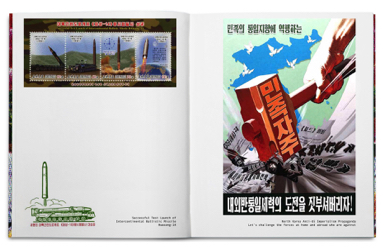
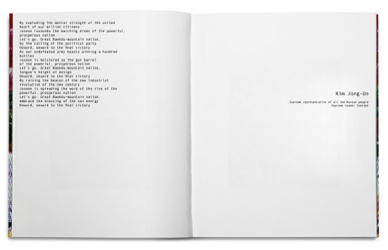
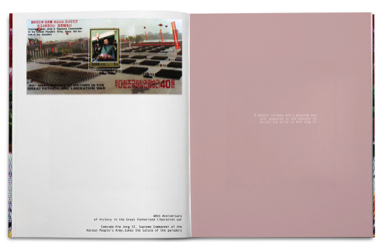
Trade edition / 35,00 euro (Vat included)
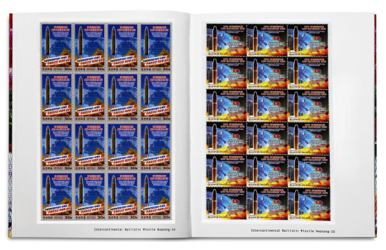
Kim is a surreal musical comedy in 5 acts - each act begins with a song - which tells the most secret state in the world through the stamps and postcards issued by KCNA, the central news agency of North Korea. In the book the relationship between the images and the selection of incredible newspaper articles on the Kim published on the web (the attribution of the invention of the hamburger, the discovery of the unicorn's den ...) contribute to creating and reinforcing that aura of mystery and incredible surrounding the country. The Democratic People's Republic of Korea has used the stamps as advertising posters to spread its socialist ideals, government achievements, heroes, political leaders, future plans and, above all, its victimization by external forces, well understanding the the power of communication through stamps and postcards such as to influence the opinions of one's own people and those of the outside world. Important political topics covered in the stamps include the army, ballistic missile launches, devoted peasants, happy students, the unification of the peninsula and, of course, the cult of the personality of the Kim dynasty. "The stamp is today the most concise and concentrated figurative medium of propaganda, almost a mural poster reduced to the minimum terms, from which the social and political substratum reveals itself with extreme clarity and meaning". (Zeri F. Italian stamps: graphics and ideology from its origins to 1948. In: History of Italian art, Part III, vol. 2, Tome I, Einaudi ed., Turin, 1980)
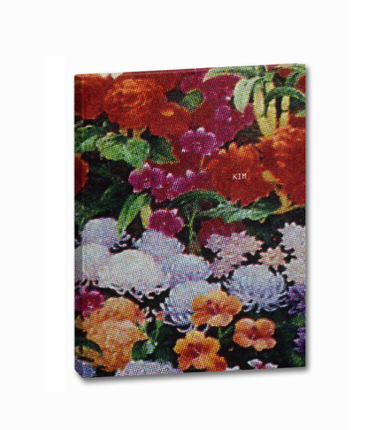
KIM
The rise and fall of the dynasty
> Kim Through the Looking Glass / On propaganda, K-pop, populism and Laibach in North and South Korea > NERO EDITIONS
© all rights reserved | 2022 | Antonio La Grotta
Kim.
The rise and fall of the dynasty
Edition of 250
19x25cm
92 Pages
Softcover with flap
IMAGES
Postcard + postage stamps
TEXT
Ilaria Benini / Kim Through the Looking Glass
excerpt from Daily Mail, Nikkei Asian Review,
The Guardian, ZABC News, Toronto Sun,The Onion, The Telegraph, Vanity Fair
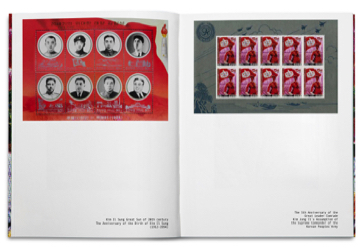
excerpt from the book
North Korea lives governed by "divinity", between an isolated reality and an unknown dimension. The strength of the Kim dynasty, in addition to the army and the feared nuclear warheads, lies in making its people believe they possess supernatural powers that were given to them by superior forces to protect them from foreign enemies. Kim Il-sung, the founder of the Kim Dynasty, ideologist of the Juche (political system inspired by communism and patriotism), is the grandfather of the current dictator. He ruled from the country's establishment in 1948 until his death in 1994. Known as the Great Leader, he established a personality cult which dominates domestic politics in North Korea. In 1998, Kim Il-sung was declared "eternal President of the Republic". During his rule, North Korea was molded into a totalitarian state . There are over 500 statues of Kim Il-sung in North Korea. Kim Il-sung's birthday, "Day of the Sun", is celebrated every year as a public holiday in North Korea. Kim Il-sung had received 230 foreign orders, medals and titles from 70 countries since the 1940s until, and after, his death. On his death in 1994, his eldest son Kim Jong-il succeeded him as supreme leader of North Korea. During his leadership of the country, Kim built on the mystique already surrounding his father and himself. Conflicting information circulated regarding his personal life, most of it unreliable and—perhaps deliberately—serving to add to the mystery.
Kim strengthened the role of the military by his Songun ("military-first") policies, making the army the central organizer of civil society. On 9 October 2006, North Korea's Korean Central News Agency announced that it had successfully conducted an underground nuclear test. In 2009, North Korea's constitution was amended to refer to him and his successors as the "supreme leader of the DPRK”. Kim was known as a skilled and manipulative diplomat but comically incompetent in matters of economic management. Kim Jong Un ascended to the throne in 2011. Kim rules a dictatorship where elections are not free and fair, government critics are persecuted, media is controlled by the regime, internet access is limited by the regime, and there is no freedom of religion. His regime operates an extensive network of prisons and labor camps; the regime convicts people for political crimes and uses collective punishment whereby members of a family get punished for the crimes of one person. Under Kim Jong-un's authority, North Korea continued its weapons-testing programs. Kim Jong-un is seen as having a more mediagenic style then his father, with the younger Kim having given a New Year's broadcast, taking in musical performances with his wife and being seen as more engaging with soldiers and workers.
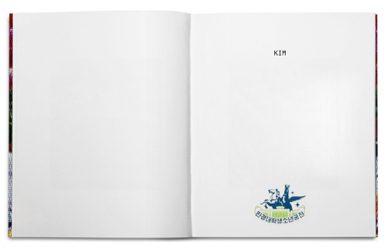
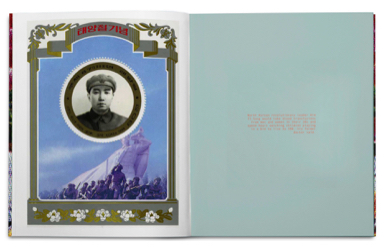
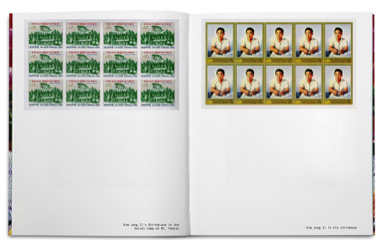
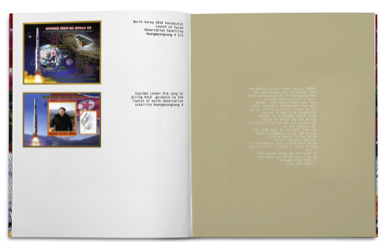
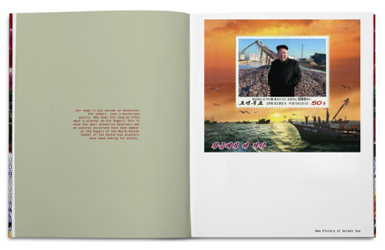
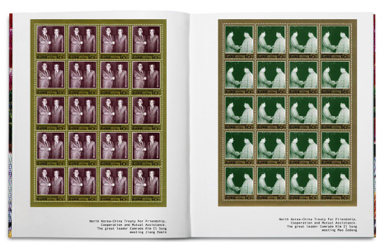
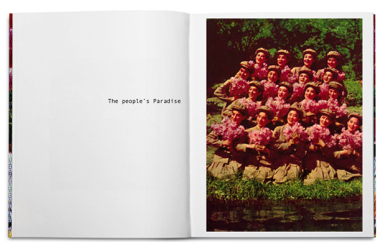
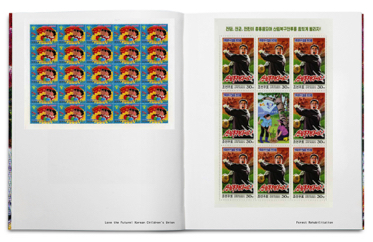
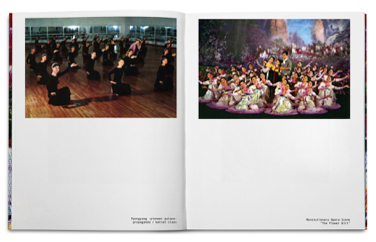
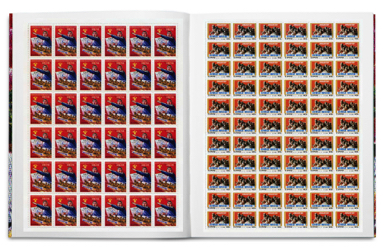
Limited edition with print / ed. 10 / 120,00 euro. (Vat + shipping included)
Choose among 2 different prints, signed and numbered edition of 4 each or 2 North Korean postage stamp
Europe - Post service 44,00 euro
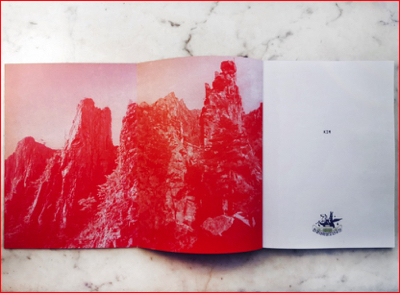
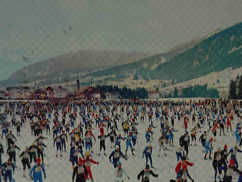
Italy - Piego libro 36,50 euro